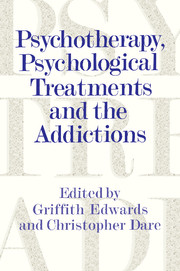Book contents
16 - A small group experience
from Part three - Postscript
Published online by Cambridge University Press: 05 August 2016
Summary
Introduction
A year before the conference I was approached by the organising committee, and invited to be a small group facilitator for four mornings at the conference from which this book derived. Although flattered by the invitation I was filled with trepidation. It seemed to me that any conference entitled ‘Psychotherapy, Psychological Treatments and the Addictions’ was at grave risk of becoming an idealistic attempt to span an unbridgeable gap between radically different fields of interest and areas of expertise. After all, don't many dynamic therapists refuse to work with people currently suffering from addictions? Don't most workers in the addictions field adopt a behaviourist approach with token economies and rewards and threats? How could one bridge the gaps? And how could one facilitate such a group?
In this brief and personal review, I will report back on what turned out to be a creative initiative - let's have groups first thing in the morning, with as wide a remit as desired. Let's talk about experiences as workers with addicts and alcoholics, as staff members in residential settings, as therapists, conference delegates, as humans with an interest in addicts and addiction. Let's talk, argue, listen, digest, think, feel.
I know there was anxiety in the small group members; what sort of a group is this, are we discussing patients and their problems, or our personal problems, or only problems raised by the conference? And I know there was anxiety in the facilitator - 1 felt unsure about how active to be, how transparent or opaque, how authoritarian or democratic, how interpretative or matter-of-fact. An out-patient detoxification clinic or an outpatient psychotherapy group felt much safer, and more familiar.
Psychodynamic therapists and analysts have written little about the addictions. Although many addicts may not be able to cope wth the rigours and relative deprivations implicit in psychoanalytic treatment, I nonetheless believe that a psychodynamic approach can help explain something about the addict's inner world, and something about his or her relationship with carers, and the very strong responses evoked in the carers. In preparing myself mentally for the conference and in particular for the small groups, I took some inspiration from the work of the British analyst Donald Winnicott (1967, published 1986).
- Type
- Chapter
- Information
- Psychotherapy, Psychological Treatments and the Addictions , pp. 259 - 264Publisher: Cambridge University PressPrint publication year: 1996



